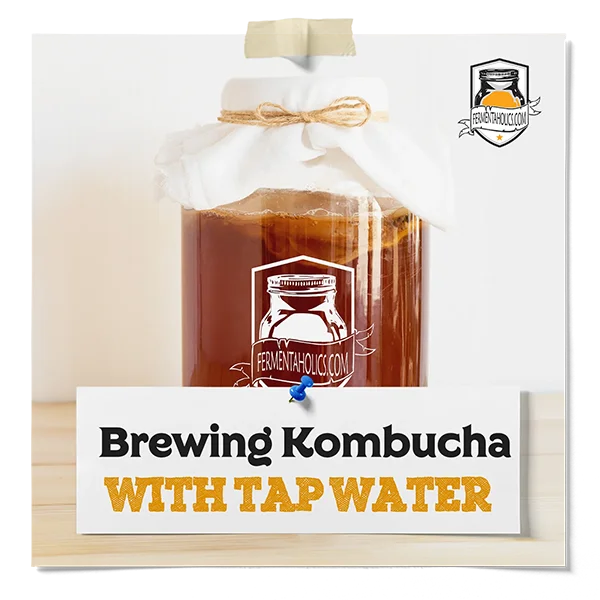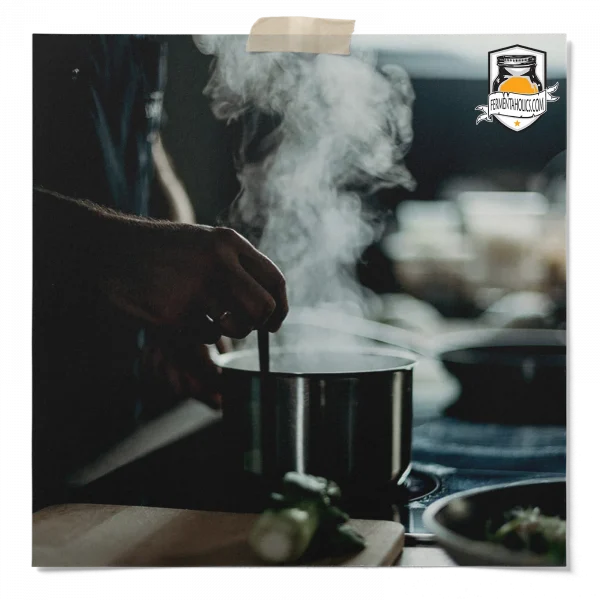
Water is probably the coolest element. It connects us to all other living things. It demands awe and boasts beauty in its ability to carve out our landscape and creates some of the most beautiful places in the world.
Water, it falls from the sky, drains down our polluted roads, past the roadkill and dog poop, and carries all of that lovely stuff with it. For this reason, municipal water sources are chemically treated with chlorine and chloramines to make sure we have a relatively safe water source. Chlorine works as a disinfectant, killing harmful bacteria and viruses that could potentially make their way into your kitchen. While chloramine and chlorine serve their role by providing safe drinking water, when you are making homemade kombucha, you want to avoid them. Not only does it kill off harmful bacteria, but it also does the same to the SCOBYs beneficial bacteria. During the kombucha fermentation, we are trying to encourage microbe growth, not inhibit it, so using dechlorinated water is an important step.
This question comes up daily, “Can I use tap water to brew kombucha?” Or some variation like “Do I need to use filtered water, spring water, mineral water, or distilled water? There is a lot of mixed information available on whether or not you should use tap water at all. So without further ado,
This can be as simple as charcoal filtering the water or boiling before use. We will go over various methods so you will be able to determine which best suits you. Bottom line, If you would like to brew kombucha with tap water, you will first need to remove the chlorine or chloramines.
Depending on where you live, your tap water will be different. If you insist on using tap water, the first step is determining what method is used to treat your water. The water treatment for tap water will be either chlorine or chloramine. You can find which way is used by contacting or visiting your utility company’s website.
Chlorine is a common antiseptic used to make drinking water safe. It is also commonly used to treat swimming pools, amongst many others. Chlorine can easily be removed from tap water.
An alternative antiseptic used to treat drinking water. It is made by reacting ammonia with chlorine bleach, the active ingredient. Chloramine isn’t as strong as chlorine, but it is much more stable. This stability makes it difficult to remove from tap water, but very possible.
The reason for the formation of a new SCOBY in the bottle is often due to the extra head space. For example, if you were to fill your swing top bottles halfway with kombucha, your bottle would now be half liquid and half air. The extra air in the bottle is now available as a resource for the culture to draw from, which will help to promote the formation of a SCOBY.
Now, similar to your primary fermentation, the bottles now have an extra but limited supply of air to work with inside the bottle. With additional air space, the likelihood of SCOBY forming inside the bottle increases.
Luckily, water filters are pretty inexpensive and last quite a while. This is probably the best and most practical option. Look for systems that use charcoal filtration, which most do now. The charcoal works to absorb impurities in the water and is effective in removing most of the chlorine and chloramines. The pitcher style filters, like the Brita Filter, use charcoal. I hooked up an under-the-sink filter in our kitchen, similar to this one that I LOVE. It has a separate faucet that comes up next to the main, making it simple to fill up a pot of water or my dog’s bowl, too!
Boiling the water for 5 to 10 minutes allows dissolved chlorine gas to escape. Chloramines prove much more persistent than chlorine, which is the very reason they are used. While chloramines can eventually be boiled off, eventually, the amount of time this takes varies from sources from 20 minutes to several hours, to not at all. For this reason, it is recommended to filter water that contains chloramines after the boil, so really, why boil in the first place? The downfall of using the boil method is that you have to boil all the water for the brew. This means you have to wait forever for the water to cool down. If you have room in the fridge, you can put the pot in there for a few hours and try to speed up the process. Or you can boil the water the night before so it will be ready to use the next day, be sure to add the tea and sugar the night before.
For water with chlorine, you can just let it sit. This method’s limited and somewhat outdated now as the use of chloramines is much more common. Nonetheless, chlorine gas will evaporate on its own at room temperature if you let it sit for approximately 24 hours. The exact timing can vary depending on chlorine content, but 24 hours is a rule of thumb.

You can simply filter it or use the boil method below:
💡 Side Note: San Francisco Water Company has an interesting article on brewing tea and coffee and its effects on neutralizing chloramines and chlorine in the tap water, as does the addition of vitamin C, like an orange. While it’s interesting, remember all tap water is a little different, so be sure to take all variables into account when it comes to brewing kombucha, and your strategy on chlorine/chloramine removal.

The quality of water is important for kombucha brewing because it impacts the health of the SCOBY and the taste of the final product.
Tap water can contain chlorine and chloramines, which are harmful to kombucha’s SCOBY. Additionally, tap water may have other contaminants that can impact the taste and quality of kombucha.
Chloramines are disinfectants used in water treatment. They are a concern because they can stay in the water longer than chlorine and are harmful to the SCOBY, negatively affecting kombucha brewing.
To remove chlorine, you can boil the water or let it sit out uncovered for 24 hours. To remove chloramines, you may need to use a carbon filter.
Distilled water can be used for kombucha brewing, but it might lack some minerals that help the kombucha ferment, so it’s not usually recommended.
Yes, filtered water is suitable for kombucha brewing as it usually has chlorine and other contaminants removed.
Yes, mineral water can be used for kombucha brewing. It has beneficial minerals and is free from harmful chemicals.
Well water can be used for kombucha brewing if it is free from contaminants. However, its quality varies and it should be tested regularly.
